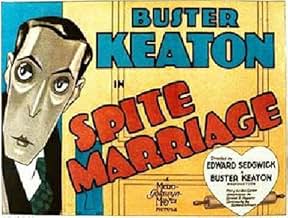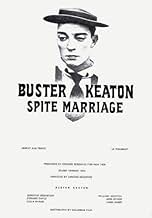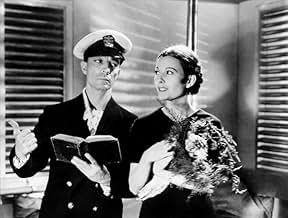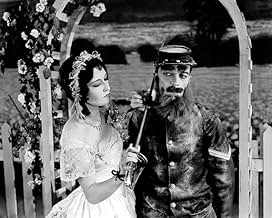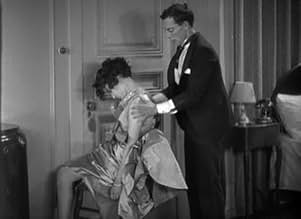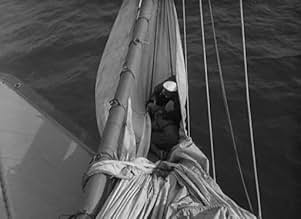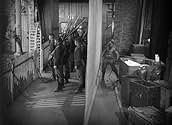IMDb RATING
6.9/10
2.7K
YOUR RATING
An unimpressive but well intending man is given the chance to marry a popular actress, of whom he has been a hopeless fan. But what he doesn't realize is that he is being used to make the ac... Read allAn unimpressive but well intending man is given the chance to marry a popular actress, of whom he has been a hopeless fan. But what he doesn't realize is that he is being used to make the actress' old flame jealous.An unimpressive but well intending man is given the chance to marry a popular actress, of whom he has been a hopeless fan. But what he doesn't realize is that he is being used to make the actress' old flame jealous.
- Directors
- Writers
- Stars
Jack Byron
- Giovanni Scarzi
- (as John Byron)
Joe Bordeaux
- Rumrunner
- (uncredited)
Ray Cooke
- The Bellboy
- (uncredited)
Mike Donlin
- Man in Ship's Engine Room
- (uncredited)
Pat Harmon
- Tugboat Captain
- (uncredited)
Sydney Jarvis
- Man in Audience Next to Elmer
- (uncredited)
Theodore Lorch
- Actor as 'Union Officer'
- (uncredited)
Hank Mann
- Stage Manager
- (uncredited)
Charles Sullivan
- Tough Sailor
- (uncredited)
- Directors
- Writers
- All cast & crew
- Production, box office & more at IMDbPro
Featured reviews
After talking pictures came out, there was a brief experiment with sound, which would logically make sense, but to illogical movie audiences didn't catch on. There are a few movies out there that attempted to ease audiences into talking pictures by creating a silent movie with sound effects, like applause, laughter, crashes, honking horns, etc. The change from silents to talkies was overwhelming, and audiences wanted it all! Why am I giving you this history lesson? Because Spite Marriage, Buster Keaton's last silent film, was a silent picture with sound.
In this one, he plays a hapless Romeo, devoted to stage actress Dorothy Sebastian. He sees her every performance and brings her bouquets of roses. The only trouble is Dorothy's in love with her costar; but when he marries someone else, she gets even by marrying Buster out of spite. The story jumps around quite a bit, so you might think you're seeing three movies in one. The first part of the film takes place in the theater, in the second part, Buster falls in with a crowd of gangsters, and in the final third, Buster and Dorothy are the only survivors on a sinking ship. While it might seem random, you won't have time to question it because you'll be mesmerized by Buster's incredible stunt work. He hangs from a rope on the mast, repeatedly gets thrown overboard only to catch himself on the boom and leap back on deck, and even falls into the sail and has to pull himself back up. Dorothy is a real trouper, participating in many of his stunts and gags, including the famous bedroom skit, recreated later by Buster and his wife onstage and by Donald O'Connor and Ann Blythe in The Buster Keaton Story. This movie feels like a very fond farewell to Buster Keaton's silent pictures, with all the elements of his famous films thrown together: a lovesick hero, dangerous stunts, funny gags, and a ship. Really the only thing missing is a train, but you can find one in almost every other of his movies.
In this one, he plays a hapless Romeo, devoted to stage actress Dorothy Sebastian. He sees her every performance and brings her bouquets of roses. The only trouble is Dorothy's in love with her costar; but when he marries someone else, she gets even by marrying Buster out of spite. The story jumps around quite a bit, so you might think you're seeing three movies in one. The first part of the film takes place in the theater, in the second part, Buster falls in with a crowd of gangsters, and in the final third, Buster and Dorothy are the only survivors on a sinking ship. While it might seem random, you won't have time to question it because you'll be mesmerized by Buster's incredible stunt work. He hangs from a rope on the mast, repeatedly gets thrown overboard only to catch himself on the boom and leap back on deck, and even falls into the sail and has to pull himself back up. Dorothy is a real trouper, participating in many of his stunts and gags, including the famous bedroom skit, recreated later by Buster and his wife onstage and by Donald O'Connor and Ann Blythe in The Buster Keaton Story. This movie feels like a very fond farewell to Buster Keaton's silent pictures, with all the elements of his famous films thrown together: a lovesick hero, dangerous stunts, funny gags, and a ship. Really the only thing missing is a train, but you can find one in almost every other of his movies.
Buster Keaton's last silent comedy was a change of pace from his earlier, independent features, lacking many of his distinctive idiosyncrasies but adding a refreshingly modern love interest with determined, temperamental actress Trilby Drew (Dorothy Sebastian), who unlike most silent film heroines gets angry, gets drunk, and throws a few well-timed temper tantrums. Because it's a corporate comedy from the MGM assembly line the film can be a bit plot-heavy at times, but even so allows room for some now classic routines: a Civil War stage melodrama sabotaged by Buster's accident-prone performance; Buster attempting to put his dead-drunk bride to bed; and a heroic chase and rescue aboard an underworld yacht. If Keaton was now performing gags that might have been suited to anyone (many seem Chaplin-inspired), at least he was doing so with his usual grace and deadpan precision, and the film highlighted a more confidant, aggressive side to his personality rarely seen in his earlier films.
"Spite Marriage" is a dividing line for Buster Keaton, the film where he began to lose control of his career. It's still a delightful movie with innovative comedy and a moving storyline, once you get past the odd and ill-fitting retooling of Buster's screen image in the first act.
Elmer Gantry (Keaton) runs a laundry, which allows him plenty of time and access to fine clothes for stalking in the guise of a rich suitor stage star Trilby Drew (Dorothy Sebastian). Trilby attaches herself to fellow star player Lionel Benmore (Edward Earle), but when Benmore takes up with a society beauty, Trilby decides to marry Elmer to show him up, to her later regret.
"Spite Marriage" is Keaton's last silent comedy (except for a short called "The Railrodder" he made near the end of his career). It's better than several of the features he made before being picked up by MGM the year before, specifically "College," "Go West," "Three Ages," and "The Saphead." But it falls short of classic Buster, often because of the role played by Buster himself.
For almost all of the first 30 minutes, viewers have to adjust to the novel notion of Buster the idiot. After an abrupt opening, we see Buster fumbling around on horseback, wiggling lovelorn in his seat as Trilby performs on stage, and finally sneaking on stage to make a mess of the show. It is funny, but in a frustrating, jerky way.
Too often the film calls attention to Buster's fish-out-of-water character, particularly when he joins the cast and stumbles over assorted props, to the annoying amusement of the audience. In his earlier films, Buster was a stoic victim of mayhem, rather than producing it himself. This made the comedy work without lessening the character. Here, you can't help but emphasize with the theatrical agent who moans: "Shoot him! They'll think it's part of the act!"
There are also odd bits of sympathy trolling. We see him bring her a stuffed dog doll with a tear running down one eye. After he discovers Trilby has left him, the camera lingers on the doll one last time, as an overt nod to Elmer's pitiful state. It's like something out of Harry Langdon.
But there are compensations throughout the early part. Trilby's play, "Carolina," is a wonderful send-up of theatrical conventions. When Lionel makes his entrance as a wounded fugitive, he stops to acknowledge the applause. "A scratch is nothing to a Southern gentleman," he tells Trilby's character, a goofy line that gets a nifty callback late in the film.
Sebastian is a big part of why "Spite Marriage" works as well as it does. For the first time, I watched a Keaton feature not pining for Sybil Seely. Trilby is no gentle flower, but rather a scheming, petty character who uses Elmer's affection for her own ends. As an ex-spite boyfriend, I could relate to this. Most important, she is very funny, especially in a scene in a speakeasy where she gets drunk and loses her cool when she sees Lionel with his new babe. It's a great use of Buster's expressionless manner by director Edward Sedgwick and the MGM team, playing it off Sebastian's scowling and histrionics. She also takes a fall as well as Buster, which helps.
The movie's most famous scene uses her athleticism to splendid effect, where he tries to put his unconscious bride to bed. He tries to sit her on a chair, only to have her roll off. As other reviewers here note, it's easy to ignore the effort she must put forth, keeping Buster hopping without apparently moving a muscle.
The finale, aboard a yacht, is the film's best sequence. Ironically, as historians John Bengtson and Jeffrey Vance note in their helpful DVD commentary, this was one part of the movie Buster didn't want to do, probably concerned he was repeating "The Navigator." But "Spite Marriage" takes the same idea in different directions, and most importantly, ramps up the laughter while giving us Buster in take-charge form. A key bit of business involves his wearing a captain's hat, which seems to signal a sense of newfound authority for the performer.
Alas, it was not to be. Buster's subsequent work for MGM, while quite profitable, would run the gamut from weak to awful, with Buster himself anything but in charge. "Spite Marriage," with its misplaced emphasis on poor, stupid Elmer, would inaugurate this trend, but it's more of a piece with his days as silent comedy's master clown. Keep this in mind, and you will have a good time.
Elmer Gantry (Keaton) runs a laundry, which allows him plenty of time and access to fine clothes for stalking in the guise of a rich suitor stage star Trilby Drew (Dorothy Sebastian). Trilby attaches herself to fellow star player Lionel Benmore (Edward Earle), but when Benmore takes up with a society beauty, Trilby decides to marry Elmer to show him up, to her later regret.
"Spite Marriage" is Keaton's last silent comedy (except for a short called "The Railrodder" he made near the end of his career). It's better than several of the features he made before being picked up by MGM the year before, specifically "College," "Go West," "Three Ages," and "The Saphead." But it falls short of classic Buster, often because of the role played by Buster himself.
For almost all of the first 30 minutes, viewers have to adjust to the novel notion of Buster the idiot. After an abrupt opening, we see Buster fumbling around on horseback, wiggling lovelorn in his seat as Trilby performs on stage, and finally sneaking on stage to make a mess of the show. It is funny, but in a frustrating, jerky way.
Too often the film calls attention to Buster's fish-out-of-water character, particularly when he joins the cast and stumbles over assorted props, to the annoying amusement of the audience. In his earlier films, Buster was a stoic victim of mayhem, rather than producing it himself. This made the comedy work without lessening the character. Here, you can't help but emphasize with the theatrical agent who moans: "Shoot him! They'll think it's part of the act!"
There are also odd bits of sympathy trolling. We see him bring her a stuffed dog doll with a tear running down one eye. After he discovers Trilby has left him, the camera lingers on the doll one last time, as an overt nod to Elmer's pitiful state. It's like something out of Harry Langdon.
But there are compensations throughout the early part. Trilby's play, "Carolina," is a wonderful send-up of theatrical conventions. When Lionel makes his entrance as a wounded fugitive, he stops to acknowledge the applause. "A scratch is nothing to a Southern gentleman," he tells Trilby's character, a goofy line that gets a nifty callback late in the film.
Sebastian is a big part of why "Spite Marriage" works as well as it does. For the first time, I watched a Keaton feature not pining for Sybil Seely. Trilby is no gentle flower, but rather a scheming, petty character who uses Elmer's affection for her own ends. As an ex-spite boyfriend, I could relate to this. Most important, she is very funny, especially in a scene in a speakeasy where she gets drunk and loses her cool when she sees Lionel with his new babe. It's a great use of Buster's expressionless manner by director Edward Sedgwick and the MGM team, playing it off Sebastian's scowling and histrionics. She also takes a fall as well as Buster, which helps.
The movie's most famous scene uses her athleticism to splendid effect, where he tries to put his unconscious bride to bed. He tries to sit her on a chair, only to have her roll off. As other reviewers here note, it's easy to ignore the effort she must put forth, keeping Buster hopping without apparently moving a muscle.
The finale, aboard a yacht, is the film's best sequence. Ironically, as historians John Bengtson and Jeffrey Vance note in their helpful DVD commentary, this was one part of the movie Buster didn't want to do, probably concerned he was repeating "The Navigator." But "Spite Marriage" takes the same idea in different directions, and most importantly, ramps up the laughter while giving us Buster in take-charge form. A key bit of business involves his wearing a captain's hat, which seems to signal a sense of newfound authority for the performer.
Alas, it was not to be. Buster's subsequent work for MGM, while quite profitable, would run the gamut from weak to awful, with Buster himself anything but in charge. "Spite Marriage," with its misplaced emphasis on poor, stupid Elmer, would inaugurate this trend, but it's more of a piece with his days as silent comedy's master clown. Keep this in mind, and you will have a good time.
This isn't bad at all, as long as you don't hold it up to the standard that Keaton set in the features he made on his own. It has some very good sequences that make up for the more routine stretches, and it shows enough of Buster's comic genius to be worthwhile. Even when the gags are not especially creative, he gets as much mileage out of them as anyone could have.
The premise of the "Spite Marriage" is rather flimsy at best, and in other hands it probably would not have been even this good. It actually starts out pretty well, as the first part moves at a good pace, and includes a very good sequence with Buster's hapless character trying to take part in a play. It begins to peter out in the middle, though, as the premise begins to wear thin. For some reason, the bedroom sequence from this portion seems to be the best-remembered portion of the movie, but it really isn't one of the better parts of the film at all. But things pick up again in the last part, when the story takes a couple of unexpected turns, and the comedy also improves.
To be sure, it is a shame that Keaton was forced into the studio mold in pictures like this. It worked for many, but not for a unique talent like Buster. Still, at least this time the result is a generally entertaining movie with more than enough laughs to make it worth watching for anyone who enjoys silent comedies.
The premise of the "Spite Marriage" is rather flimsy at best, and in other hands it probably would not have been even this good. It actually starts out pretty well, as the first part moves at a good pace, and includes a very good sequence with Buster's hapless character trying to take part in a play. It begins to peter out in the middle, though, as the premise begins to wear thin. For some reason, the bedroom sequence from this portion seems to be the best-remembered portion of the movie, but it really isn't one of the better parts of the film at all. But things pick up again in the last part, when the story takes a couple of unexpected turns, and the comedy also improves.
To be sure, it is a shame that Keaton was forced into the studio mold in pictures like this. It worked for many, but not for a unique talent like Buster. Still, at least this time the result is a generally entertaining movie with more than enough laughs to make it worth watching for anyone who enjoys silent comedies.
Though not of the quality of "The General," an almost perfect movie, "Spite Marriage" is worth watching both for the fun and for the historical value of its being Keaton's last silent.
Co-star Dorothy Sebastian deserves a medal both for her performance and for putting up with being knocked about so.
So many of Keaton's leading ladies get treated very physically, surely part of the auditions was a test of their good-natured sportsmanship -- and probably their physical conditioning, too.
Dorothy Sebastian's character is not very sympathetic at first, but she learns, and when she has to assist in her own rescue, she is adorable, cute as the proverbial button.
Keaton, though, is the real reason to watch, this or almost everything else he is in.
He ranks among the top of the certifiable geniuses of motion picture making, with an unfailing sense of timing, with uncanny physical control, and with an understanding of what was (and is) funny that the studio bosses of his latter career should have paid attention to.
Even with the worst material, with which he was saddled in so many of his talkies, Keaton and his abilities and talents still stand out, are still memorable.
Buster Keaton will deserve our awe forever.
Co-star Dorothy Sebastian deserves a medal both for her performance and for putting up with being knocked about so.
So many of Keaton's leading ladies get treated very physically, surely part of the auditions was a test of their good-natured sportsmanship -- and probably their physical conditioning, too.
Dorothy Sebastian's character is not very sympathetic at first, but she learns, and when she has to assist in her own rescue, she is adorable, cute as the proverbial button.
Keaton, though, is the real reason to watch, this or almost everything else he is in.
He ranks among the top of the certifiable geniuses of motion picture making, with an unfailing sense of timing, with uncanny physical control, and with an understanding of what was (and is) funny that the studio bosses of his latter career should have paid attention to.
Even with the worst material, with which he was saddled in so many of his talkies, Keaton and his abilities and talents still stand out, are still memorable.
Buster Keaton will deserve our awe forever.
Did you know
- TriviaBuster Keaton wanted this film to be a full talkie, but MGM released it with only a musical score and sound effects. One thing that prevented this picture from being a full talkie was that MGM was late to the sound game and had only one full set of recording equipment at the time. Its Loew's Theater chain also was not yet fully equipped to show sound pictures. Plus, MGM's head of production reasoned Keaton's films were made with a lot of time-consuming improvisations and didn't think the added expense of using valuable, scarce sound equipment was worth it.
- GoofsIn the dressing-room, while attempting to trim the hair for his false beard, Elmer accidentally severs the left-hand shoulder strap of his tank-top undershirt and has no time to repair it. When he hurriedly changes back into his smart clothes after the performance, both straps are still whole.
- Quotes
Trilby Drew: What's that blonde hanging around you for?
Lionel Benmore: Can I help it if I'm good-looking?
- Crazy creditsRather than appear at the beginning, the MGM roaring lion opening appears after the conclusion of the film, but just before "The End" title, which immediately follows it.
- ConnectionsFeatured in Arena: Cinema: Christmas Special (1976)
- SoundtracksI'd Rather Be Blue Over You
(uncredited)
Music by Fred Fisher
Lyrics by Billy Rose
Played as background music at the cafe
- How long is Spite Marriage?Powered by Alexa
Details
- Release date
- Country of origin
- Languages
- Also known as
- Spite Marriage
- Filming locations
- Hotel Carmel - 201 Broadway St, Santa Monica, California, USA(Lionel confronts Buster outside this hotel on the 2nd Street side - still in business in 2022)
- Production company
- See more company credits at IMDbPro
- Runtime
- 1h 16m(76 min)
- Aspect ratio
- 1.33 : 1
Contribute to this page
Suggest an edit or add missing content

